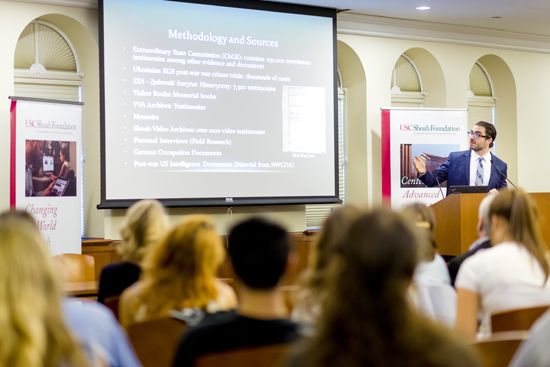Greenberg Research Fellow Jared McBride Identifies Holocaust Victims and Perpetrators Through Testimony

By Aleksandra Visser
USC Shoah Foundation Intern
For Jared McBride, the 2014-2015 Margee and Douglas Greenberg Fellow, using multimedia techniques in his research not only helps him form more detailed historical narratives of what happened on the ground during the Holocaust, it also helps him reach more people today about the importance of understanding this major historical event.
In January, McBride gave a talk to students, staff and faculty at USC titled “Constructing a Micro-history of the Holocaust in Western Ukraine.” In his lecture, he addressed the success and difficulty of working with archival sources, as well as testimonies from USC Shoah Foundation’s Visual History Archive.
He said that in many cases, testimony from the Visual History Archive helps confirm information that is otherwise difficult to access in many of the former Soviet territories. During German occupation of the Volhynia region in Western Ukraine, much of the pogrom activities and initial killings were conducted on the ground by local police forces. This is an observation he was able to make based on information gained through testimony.
Focusing his research on the perpetrators of this violence, McBride's study looked at the involvement of the Ukrainian police in the border Volhynia region and their actions toward victims who were in many cases acquaintances or even neighbors. Choosing a micro-historical approach to the region, McBride sought to identify specific perpetrators and link them to their victims.
Through archival material, he has been able to collect a biographical database of Ukrainian perpetrators in Volhynia; the Visual History Archive allowed him to obtain testimony confirming the involvement of these specific perpetrators, who are often named by their victims.
Using this in-depth research, McBride has met with survivors who gave testimony to the Visual History Archive and helped them to find closure about the nature of their attackers. McBride's lecture was indicative of the ways that scholars are now using multimedia research techniques to form more detailed historical narratives. His presentation allows for the opening of a much broader historical debate about the implementation these new methods and the future of the field.
Dr. McBride will be a Visiting Assistant Professor at Columbia University, where he will teach two courses on the Ukraine and its position as a borderland. For the fall semester, Dr. McBride will travel to Washington, D.C., where he will be a Fellow at the United States Holocaust Memorial Museum. Throughout the year, he will continue to work closely with researchers at the Center for Advanced Research in order to gather information on Volhynia for his dissertation-turned book project on the Holocaust in the region.